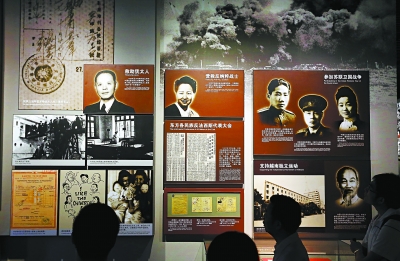Overseas Chinese had vital role in WWII

Visitors look at a display of the contributions of overseas Chinese to the world anti-fascist war on July 24 at the Museum of the War of Chinese People’s Resistance Against Japanese Aggression in Beijing.
Overseas Chinese made great contributions to the world anti-fascist war and were also an important part of the national united front against Japan, scholars said at a seminar.
At the international academic seminar "Overseas Chinese and the World Anti-Fascist War," held on July 25, scholars from such countries as China, the US, and Japan considered the contributions that overseas Chinese in North America, Europe, Australia and Southeast Asia made to the war from different angles.
Gao Shihua, editor-in-chief of the Journal of Studies of China's Resistance War Against Japan, put forward the concept of “historical facts relevant to the war” in the preface of its first issue in 2013. He contended that historical studies on China's war of resistance against Japan should not be limited to the study on the war period but also include such topics as modern China-Japan relations, modern Japanese history, postwar China-Japan relations and the influence of the war.
Overseas Chinese studies from this perspective have undoubtedly challenged Eurocentric historical narratives. Zhang Xiuming, deputy director of Overseas Chinese History Studies Institute, said the topic has important historical and practical significance in terms of clarifying the facts surrounding Japan’s invasion of China and comprehensively reflecting the ins and outs of China's war of resistance.
The entry of other nations into the fight against Japan profoundly affected the identity of Chinese living overseas societies as China became a battlefield in the larger Pacific War. Li Yinghui, a professor of history at National Chi Nan University in Taiwan, said that overseas Chinese transcended all geographic boundaries to help Chinese and locals fight against Japan during WWII. Significantly, many overseas Chinese directly joined American, British and Soviet forces as soldiers or intelligencers during the war.
“The theme of the seminar is not only to show the outstanding contributions that overseas Chinese have made to support China against Japan but also to highlight the role and meaning of overseas Chinese in the world anti-fascist war. This perspective focuses on world history, and is more broad and profound than that of ‘historical facts relevant to the war.’ ” said Zhang Zhenjiang, a professor at the Academy of Overseas Chinese Studies of Jinan University in Guangdong Province, adding that as a research topic, the studies should be interdisciplinary.
He said the world anti-fascist war is an important historical node for shaping overseas Chinese communities. “The abundant and specific micro researches presented and appealed to in the seminar are the basis and materials of deepening overseas Chinese studies in future.”
Wu Yong is a reporter at the Chinese Social Sciences Today.
